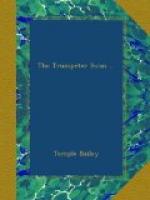Night after night he sat in his room up-stairs in the old Schoolhouse, and wrote on “The Trumpeter Swan.” It was an outlet for his pent-up emotions, and something of the romance which was denied him, something of the indignation which stirred him, something of the passions of love and revenge which fought within him, drove his pen onward, so that his little tale took on color and life. Crude, perhaps, in form, it was yet a song of youth and patriotism. It was Randy’s call to his comrades. There was to be no compromise. They must make men look up and listen—to catch the sound of their clear note. The ideals which had made them fight brutality and greed were living ideals. They were not to be doffed with their khaki and overseas caps. Their country called, the whole world called, for men with faith and courage. There was no place for pessimism, no place for materialism, no place for sordidness.
His hero was, specifically, a man who had come back from the fighting, flaming with the thought of his high future. He had found the world smiling and unconcerned. It was this world which needed to listen to the call of trumpets—high up——
The chapters in which he wrote of love—for there was a woman in the story—were more beautiful than Randy realized. It was of a boy’s love that he told—delicately. It was his own story of love denied, yet enriching a life.
Yet—because man cannot live up always to the measure of his own vision, there came often between Randy and the written page the image of George Dalton, smiling and insolent. And he would lay down his pen, and lean his head on his hand, and gaze into space, and sometimes he would speak on in the silence. “I will make him suffer.”
It was in one of these moments that he saw how it might be done. “He would let fruit drop to the ground and rot if no other man wanted it,” he analyzed keenly, “but if another man tried to pick it up, he would fight for it.”
Dalton was still at King’s Crest. Mrs. Waterman had not responded satisfactorily to the operation. The doctors had grave doubts as to her recovery. Madge was convalescing at the Flippins’.
Randy had been content, hitherto, to receive bulletins indirectly from both of the invalids. But on the morning following the birth of his great idea he rode on horseback to King’s Crest. He looked well on horseback, and in his corduroys, with a soft shirt and flowing tie, a soft felt hat, he was at his best.
He found George and Oscar on the west terrace, shaded by blue and white-striped awnings, with a macaw, red and blue on a perch—a peacock glimmering at the foot of the steps—and the garden blazing beyond.
There were iced drinks in tall glasses—a litter of cigarettes on smoking-stands, magazines and newspapers on the stone floors, packs of cards on a small table. Oscar, hunched up in a high-backed Chinese chair, was white and miserable. George looked bored to extinction.




